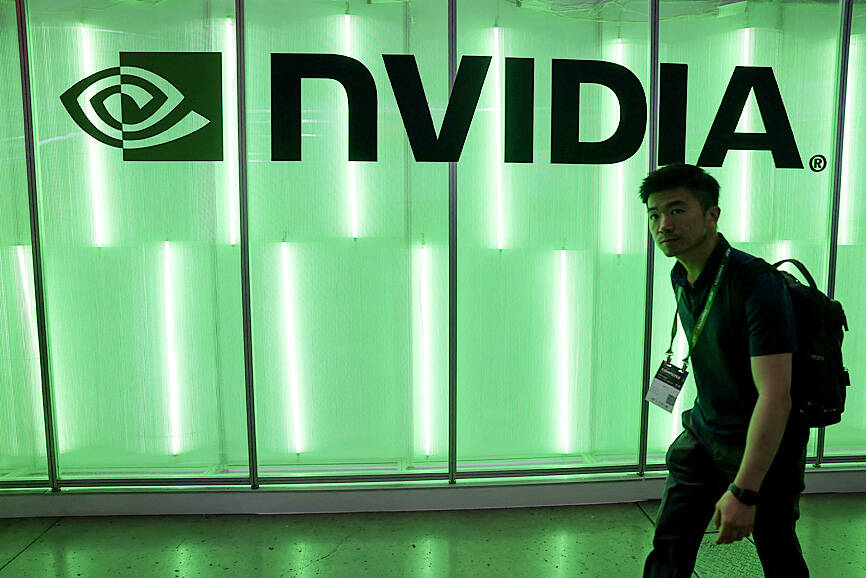Antitrust tensions are heating up in the chipmaking industry, as rivals have accused Wall Street darling Nvidia Corp of abusing its market dominance in selling chips that power artificial intelligence (AI) — and the US Department of Justice is now investigating these complaints, technology news site The Information reported.
The news outlet, which cited unnamed sources familiar with the discussions, said that justice department officials are looking into concerns that Nvidia is potentially cornering the market and pressuring its customers to unfairly retain business.
That includes allegations of Nvidia threatening to punish those who buy products from the Santa Clara, California-based tech giant and its competitors.

Photo: Ann Wang, Reuters
The Information also reported that US officials had reached out to several Nvidia competitors about the complaints.
The justice department declined to comment or provide further information when reached on Friday.
However, a statement from Nvidia said the company “wins on merit” — and competes “based on decades of investment and innovation, scrupulously adhering to all laws.”
Without directly acknowledging details of The Information’s Thursday report, the company added that it is “happy to provide any information regulators need.”
Nvidia has faced calls for an antitrust investigation from some Democratic lawmakers and progressive groups before. Earlier last week, 10 progressive advocacy groups — including Demand Progress Education Fund and Tech Oversight Project — penned a letter to US Assistant Attorney General Jonathan Kanter in support of an antitrust investigation into the chipmaker.
“Nvidia is the world’s chip gatekeeper,” the groups wrote, adding that the company had “bullied its way into a prominent investment position” by leveraging scarce supply alongside tactics like blocking customers from doing business with competitors.
“Such a company deserves the most aggressive scrutiny that the Department of Justice can bring to bear,” they said.
Nvidia has cemented itself as a poster child for the AI boom — and in the process become one of the most valuable companies in the world. In June, the tech giant briefly reached a market value of more than US$3.3 trillion.
Nvidia’s upcoming AI chips would be delayed due to design flaws, The Information reported, citing two unidentified people who help produce the chip and its server hardware.
The chips might be delayed by three months or more, which could affect Nvidia’s customers including Meta Platforms Inc, Google LLC and Microsoft Corp.
Nvidia last week informed Microsoft about a delay affecting the most advanced AI chip models in the Blackwell series, an unidentified Microsoft employee and another person said.
The delays mean big shipments are not expected until the first quarter of next year, The Information added.
A spokesperson for Nvidia would not comment on its statements to customers about the delay, but told The Information that “production is on track to ramp” later this year.
Additional reporting by Bloomberg

SELL-OFF: Investors expect tariff-driven volatility as the local boarse reopens today, while analysts say government support and solid fundamentals would steady sentiment Local investors are bracing for a sharp market downturn today as the nation’s financial markets resume trading following a two-day closure for national holidays before the weekend, with sentiment rattled by US President Donald Trump’s sweeping tariff announcement. Trump’s unveiling of new “reciprocal tariffs” on Wednesday triggered a sell-off in global markets, with the FTSE Taiwan Index Futures — a benchmark for Taiwanese equities traded in Singapore — tumbling 9.2 percent over the past two sessions. Meanwhile, the American depositary receipts (ADRs) of Taiwan Semiconductor Manufacturing Co (TSMC, 台積電), the most heavily weighted stock on the TAIEX, plunged 13.8 percent in

A wave of stop-loss selling and panic selling hit Taiwan's stock market at its opening today, with the weighted index plunging 2,086 points — a drop of more than 9.7 percent — marking the largest intraday point and percentage loss on record. The index bottomed out at 19,212.02, while futures were locked limit-down, with more than 1,000 stocks hitting their daily drop limit. Three heavyweight stocks — Taiwan Semiconductor Manufacturing Co (TSMC, 台積電), Hon Hai Precision Industry Co (Foxconn, 鴻海精密) and MediaTek (聯發科) — hit their limit-down prices as soon as the market opened, falling to NT$848 (US$25.54), NT$138.5 and NT$1,295 respectively. TSMC's

TARIFFS: The global ‘panic atmosphere remains strong,’ and foreign investors have continued to sell their holdings since the start of the year, the Ministry of Finance said The government yesterday authorized the activation of its NT$500 billion (US$15.15 billion) National Stabilization Fund (NSF) to prop up the local stock market after two days of sharp falls in reaction to US President Donald Trump’s new import tariffs. The Ministry of Finance said in a statement after the market close that the steering committee of the fund had been given the go-ahead to intervene in the market to bolster Taiwanese shares in a time of crisis. The fund has been authorized to use its assets “to carry out market stabilization tasks as appropriate to maintain the stability of Taiwan’s

In a small town in Paraguay, a showdown is brewing between traditional producers of yerba mate, a bitter herbal tea popular across South America, and miners of a shinier treasure: gold. A rush for the precious metal is pitting mate growers and indigenous groups against the expanding operations of small-scale miners who, until recently, were their neighbors, not nemeses. “They [the miners] have destroyed everything... The canals, springs, swamps,” said Vidal Britez, president of the Yerba Mate Producers’ Association of the town of Paso Yobai, about 210km east of capital Asuncion. “You can see the pollution from the dead fish.